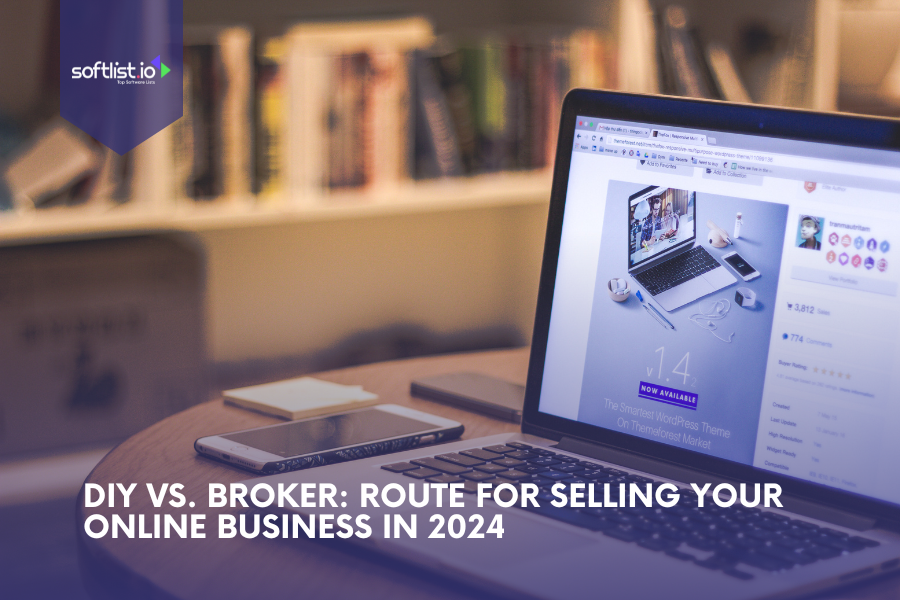Choosing how to sell your online business is a critical decision, not one to be taken lightly. The difference between handling the sale yourself and hiring a broker can significantly impact your experience and the outcome.
On the one hand, selling on your own might seem appealing with the promise of avoiding hefty commission fees. If you’re already well-versed in your niche, whether it’s dropshipping or affiliate marketing, this option allows you to leverage your understanding of the market. You can directly connect with potential buyers interested in your online business idea, ensuring you can tell your story just as you envision it.
On the other hand, leveraging a broker’s expertise could streamline the process and help secure the best possible price. A broker is often familiar with the nuances of the market, especially as we move into 2024, and can provide insights into current trends and valuations. They handle negotiations and paperwork, allowing you to focus on other aspects of your business or even start a new venture, like exploring the best online business ideas.
Key Takeaways
- Comprehensive Due Diligence is Crucial: When buying an online business, thorough due diligence is crucial. Review financial statements, analyze customer reviews, and evaluate the business’s operations to ensure a sound investment.
- Strategic Planning is Essential: Successful online business acquisition requires strategic planning. Set clear goals, research the market, develop an exit strategy and business plan, and negotiate favorable terms. A well-thought-out plan can significantly increase your chances of turning a small business into a successful purchase and having a profitable business.
- Legal and Financial Considerations: Understand the legal and financial aspects of buying an online business. Review contracts, ensure compliance with regulations, and secure adequate financing to complete the transaction.
Start Understanding Online Business Sales

Source: Canva
Whether you’re contemplating selling an eCommerce venture like a dropshipping business or just curious about starting an online business, beginning with a firm understanding is crucial. This insight not only aids in decision-making but also impacts your strategy to maximize your business’s value.
Understanding how businesses operate within an online niche and recognizing the need in the market for selling your products, reselling items, or providing products or services, such as audiobooks or affiliate links, is key to business growth. Conducting market research to find the right suppliers and positioning your business name effectively will strengthen your ecommerce business. Whether you choose to leverage marketing services or manage the sale independently, knowing your options—DIY or through a broker—can help you maximize the outcome.
What Constitutes an Online Business?
An online business, quite simply, refers to any company that operates primarily on the Internet. This includes various ventures, from online retail stores to digital service providers offering services to clients. The eCommerce industry allows entrepreneurs who want to start an online business to buy and sell goods or services online, transcending the boundaries of traditional brick-and-mortar establishments.
Whether setting up a website or developing social media accounts, marketing efforts are crucial for building a client base. For those exploring online business ideas for 2024, such ventures offer opportunities to create a new business with diverse products or services, leveraging social media marketing to reach a global audience. Whether you want to start marketing your business or sell when the time comes, finding the approach that suits your interests is vital to starting a successful venture. Here’s what you need to get you started.
The Elements of Successful Business Online Selling In 2024
Selling an online business is a significant decision, whether it’s an online store or another digital venture. Whether you’re working with types of online businesses you can start or already operate from home, the choice between a DIY approach or hiring a broker can make a substantial difference in the sale’s success. Let’s delve into these options to help you determine which strategy might suit your business best.
- Target Audience: Knowing your target market is essential. This involves understanding who your buyers are and what they need. Many starters in eCommerce find it challenging to pinpoint their ideal customer.
- Digital Marketing Agency: From social media promotions to search engine optimization, digital marketing is the backbone for reaching and engaging potential customers.
- User Experience: A seamless user experience, from easy navigation to quick checkout, can significantly boost sales.
- Trustworthiness: Establishing trust through secure payment options and transparent policies is key. Having trustworthy service providers for transactions reduces friction and builds credibility.
- Legal Considerations: Understanding the legalities, like taxes and regulations, assures smooth operations without unanticipated setbacks.
The Role of Platforms and Tools
Choosing the right platform can make or break your online sales success. Platforms like Shopify and BigCommerce have made eCommerce more accessible than ever, providing tools to handle everything from inventory management to customer relations. These platforms empower small business owners by enabling them to reach a wider audience and build scalable business models.
With a range of tools at your disposal, platforms like these enable automation, which saves both time and effort, allowing you to focus more on strategic decisions rather than the operational grind. Suppose you’re a small business owner or an entrepreneur looking at business ideas you can start. In that case, building a solid foundation that makes your business attractive to potential buyers is essential.
The Value of Online Business Ideas and Trends
Finally, staying updated with the latest trends and insights in the industry is crucial. Whether you’re managing an e-commerce business, a remote tech support business, or an online consultancy, evaluating current market demand and competition helps position your business for success when it’s placed for sale. This also applies to businesses utilizing influencer marketing or hosting online conferences to grow their reach.
Whether you’re running a profitable online business with products to sell or offering digital services like a passion for fashion consultancy, knowing the landscape will help you understand how other companies operate and where yours fits in. By watching industry shifts and consumer behavior, you’ll be better equipped to attract the right buyers who see value in what your online business offers.
The DIY Approach to Selling Online Businesses

Source: Canva
When you choose the DIY route, you opt for a path filled with opportunities and challenges. Selling your online business can be profitable, especially if you’re running one of the best online businesses to start. Control, cost savings, and independence are appealing aspects of this approach, but they come with hurdles, such as a lack of experience and negotiation skills.
Many online businesses, from consulting firms to those offering online courses, can benefit from a DIY sale. Still, it requires thorough knowledge of marketing strategies, content marketing, and even your products and services. With this approach, you’re positioned to leverage various marketing tactics, such as content marketing, to attract buyers looking to start a business online or expand their portfolio of online businesses.
Taking this route could be ideal if you aim to start selling your business in 2024, are ready to handle negotiations independently, and are keen on using your knowledge of how different online ventures operate to make money online. To Start your online sale without a broker means you’ll need a firm grasp of the intricacies of business transactions. Still, for many, it’s a rewarding path that lets you retain complete control while helping you start your next venture.
Let’s explore both sides to help you decide if DIY selling is right for you.
Pros of DIY Selling
Are you thinking about selling your online business on your own? Here are some benefits that might make this decision worthwhile:
- Cost Savings: Avoiding broker fees can save you a significant amount of money. Brokers usually charge a percentage of the selling price, which can be a sizable chunk, especially for high-value business deals. Forbes explains the potential savings in more detail.
- Full Control: You maintain full control over the selling process. You’re the captain of this ship, making all the pricing decisions, how you want your business marketed, and to whom you wish to sell.
- Personalized Approach: You know your business better than anyone else. This insight allows you to present your business authentically, potentially creating a stronger, more persuasive connection with prospective buyers.
- Flexibility: DIY selling allows you to draft your timeline. If you’re not in a rush, you can take your time finding the right buyer without the pressure a broker might exert to close a deal quickly.
Cons of DIY Selling
On the flip side, going solo isn’t without its challenges. Here’s why some business owners opt to use a broker:
- Lack of Market Knowledge: Brokers have access to market data and can often provide a valuation that optimally reflects market trends.
- Negotiation Skills: Successful sales often come down to negotiating the best deal. Brokers bring experience and expertise in haggling, which could lead to better terms for your sale.
- Limited Network: Brokers have well-established networks and buyer lists. Without this, you might find getting the word out about your sale more difficult.
- Time-Consuming: Selling a business is akin to a full-time job. The time and effort required might detract from running your business efficiently during the selling process.
Selling your online business yourself requires weighing these pros and cons carefully. Ensuring you’re well-prepared can help you make an informed decision. As you take on this task, consider your capability and your willingness to handle it alone.
Using a Broker for Online Business Sales

Source: Canva
When you’re thinking about selling online businesses, such as a consulting business, you might wonder if using a broker is the right choice. There’s a lot to weigh as you consider the pros and cons. Brokers can bring several advantages, from specialized expertise in market research to an extended network of buyers, which can help enhance your online presence. This can be especially beneficial for businesses that are easy to start or those looking to start in 2024.
However, there are also potential downsides you should be aware of before making this important decision. Whether it’s the cost associated with hiring a broker or the control you might lose over the sale process, understanding these aspects will help you make a more informed choice.
Pros of Using a Broker
Using a broker can offer several benefits that simplify the selling process and potentially lead to a better deal.
- Market Expertise
Brokers specializing in online businesses understand the intricacies of digital platforms and e-commerce trends. Their knowledge helps in properly valuing your business and identifying the right buyers. By capitalizing on expert knowledge about the market, you can ensure that your venture is presented attractively. - Negotiation Skills
Negotiating the sale of a business is no small feat. Using a broker can provide you with an experienced negotiator who knows how to secure the best terms. They act as a middleman to help reduce emotional decision-making and maximize the final sale price. - Access to a Broader Buyer Network
Brokers come equipped with established networks of potential buyers. This can be a significant advantage as it opens up the pool to qualified buyers you might not reach on your own. Connect with brokers that have access to qualified and serious buyers, making the selling process smoother and faster.
Cons of Using a Broker
Despite the benefits, there are several drawbacks to involving a broker in your online business sale.
- Commission Fees
The most obvious downside to hiring a broker is the cost. Typically, brokers charge a commission, which can be a significant percentage of the sale. This fee could substantially reduce your net profit from the sale. - Potential Conflicts of Interest
Sometimes, brokers might have interests that don’t align perfectly with yours. For example, they might push for a quicker sale at a lower price to ensure they get their commission quickly. Conflicts of interest can be real, so it’s crucial to have detailed discussions about alignment before entering an agreement.
Evaluating these pros and cons will help you decide if a broker is right for your sale. Knowing what each can bring makes you better prepared to make an informed choice.
Evaluating Costs: DIY vs Broker

Source: Canva
Choosing between a DIY sale or employing a broker to sell your online business is a crucial decision that directly impacts your financial bottom line. Each approach comes with its own expenses and may influence how much of the sale proceeds you’ll take home. Understanding these cost differences is key to making an informed choice.
DIY Sale: Unpacking the Costs
Opting to handle the sale yourself may seem like a great way to maximize profits by cutting out middlemen, but it comes with its financial commitments. Here’s what you might be up against:
- Marketing and Advertising: Without a broker, you are responsible for marketing your online business for sale to potential buyers. This might include paying for online listings or advertisements across various platforms.
- Legal and Consultancy Fees: You’ll likely need to hire legal experts to ensure contracts are legally binding and meet industry standards. Consulting fees for valuing your business or strategic advice can also add up.
- Time Investment: Time is money, as the saying goes. The hours you spend handling the sale process, researching, negotiating, and closing the deal translate into a cost, especially if it detracts from running your business effectively.
Selling independently can be less costly if managed correctly, but it demands thorough preparation and the willingness to handle all aspects of the sale.
Broker Services: What You’re Paying For
Employing a broker means handing over a part of your sales revenue in return for their expertise and services. Let’s break down what those fees typically cover:
- Commission Fees: Brokers usually charge a success fee, often between 5% and 15% of the sale price. This fee tends to vary based on the broker’s reputation and the complexity of the sale.
- Professional Network Access: Brokers bring a client network that can attract qualified buyers quickly, potentially fetching a better sale price.
- Negotiation Expertise: With extensive market knowledge, brokers can negotiate deals that align with your financial interests, often handling legal negotiations and documentation efficiently.
- Reduced Hassle: The broker manages the logistical and administrative tasks, which can save you significant time and stress.
Although hiring a broker can increase the total cost of the sale, some believe the time and potential for a higher sale price can justify this expense.
Making the Decision
Whether you choose a DIY sale or hire a broker largely depends on your specific situation, available time, and comfort level with the sales process. Assessing the costs associated with each option will help ensure that you decide to support your objectives and financial needs best.
Legal Considerations in Selling an Online Business

Source: Canva
Selling an online business is not just about finding a buyer and agreeing on a price. It involves handling various legal aspects to ensure a smooth transition and mitigate potential risks.
Whether you choose the DIY route or hire a broker, understanding these legal considerations can protect you from future liabilities. Here’s what you need to know:
Business Licenses and Permits
To legally sell an online business, you must ensure all necessary licenses and permits are in place. These legal documents validate the legitimacy of your operations. Depending on your location and the nature of your business, the required documentation might vary. Do you need a sales tax license or a federal employer identification number? Confirming these details is crucial.
- Seller’s Permit: Nearly all states require this for businesses dealing in tangible goods or services online.
- Business Licenses: To run and sell your online business legally, you typically need a business license. This license recognizes your business as a taxable entity.
Intellectual Property Rights
The value of an online business often hinges on its branding, content, and proprietary technology. Protecting these elements through intellectual property rights is essential. This ensures the new owner can use and benefit from the business assets without infringement issues.
- Trademarks and Copyrights: Protect logos, brand names, and unique content from being used by competitors.
Start Business Contracts and Agreements
One of the most critical parts of selling an online business is drafting and reviewing contracts. These legal agreements outline the terms of the sale and the responsibilities of both parties and provide a blueprint for the transaction.
- Sales Agreement: This detailed contract specifies the purchase price, payment terms, and any contingencies. Seek professional legal advice to avoid pitfalls.
- Terms of Service and Privacy Policies: If your business involves user data, these documents protect your company and the buyer from legal issues concerning data privacy laws.
Tax Obligations
Understanding the tax implications of online businesses for sale can save you from unexpected expenses. You might need to pay capital gains tax on the sales profits and ensure all previous taxes, such as sales and income tax, are settled.
- Capital Gains Tax: The sale may result in capital gains taxes, calculated based on the increased value of your business.
- Sales Tax Compliance: Ensuring that all collected and reported state taxes are up-to-date before finalizing the sale is crucial. This might include revisiting state-specific regulations.
By tackling these legal considerations head-on, you’ll position yourself and your online business for a successful sale. The peace of mind that comes with being legally prepared is invaluable in any business transaction.
Best Buy and Sell Online Businesses
|
Primary Rating:
3.5
|
Primary Rating:
3.5
|
Primary Rating:
3.5
|
Conclusion
Choosing between a DIY sale and using a broker involves careful consideration. DIY selling offers cost savings and direct control but can be labor-intensive and requires significant market knowledge. Using a broker may come with higher costs, yet it provides expertise and a wider network and reduces the burden on the seller.
Understanding your unique online business needs is crucial. Are you equipped to face the complexities of a sale, or is the guidance of a broker worth the investment? Take a moment to weigh the pros and cons presented, and consider what fits best with your business goals and personal strengths.
Want to stay updated with the latest tools and insights? Subscribe to our website for exclusive ‘Deals and Promotions’ and ‘Top Product Reviews’ straight to your inbox.
Also, check out our “Guide to Selling Websites” guide to discover the best practices for selling your online business!
Frequently Asked Questions About Selling Online Businesses
Selling an online business can be a profitable and productive venture. Whether you’re transitioning to a new venture or ready to cash in on your hard work, understanding the key components of the process is crucial.
This FAQ section provides helpful insights on timelines, pricing, common pitfalls, and more. Let’s dive into the essentials to empower your selling strategy.
What Is the Typical Timeline for Selling an Online Business?
The time it takes to sell an online business can vary widely based on several factors. Generally, expect the process to take anywhere from three to twelve months. The length of time often depends on the business’s size, niche, and financial health. For example, simpler deals may close in just a few months, while more complex sales can take over a year.
Factors such as thorough preparation, clear financial documentation, and realistic pricing can help streamline and potentially shorten the sale process. By focusing on these areas, sellers can improve their chances of a quicker and more effective transaction.
Is It Worth Paying a Broker for Assistance?
Hiring a broker can simplify the selling process significantly. Brokers bring industry knowledge and negotiate on your behalf, which can lead to achieving a higher sale price. They handle the complex parts of the deal, allowing you to focus on other priorities. With their help, business owners often experience smoother transactions and favorable terms.
While brokers do charge a commission, their expertise might justify the expense, especially in more competitive markets or when time is a constraint. Carefully weighing the benefits and costs will help you decide if engaging a broker aligns with your selling goals.
How Do I Determine the Right Sale Price for My Online Business?
Determining the right sale price for your online business is crucial for attracting serious buyers. Begin by evaluating your company’s performance, assets, and market position through a comprehensive valuation process. Key steps include:
- Assessing Financial Performance: Calculate profitability, revenue trends, and growth potential.
- Asset Evaluation: Consider tangible and intangible assets, like intellectual property and brand reputation.
- Market Analysis: Research similar sales in your industry to gauge competitive pricing.
Accurate pricing minimizes negotiations, speeds up the sale, and ensures you receive fair market value for your business.
What Are the Most Common Mistakes When Selling Online Businesses?
Avoiding pitfalls can significantly impact the success of your business sales. Here are some frequent mistakes to be aware of:
- Overvaluing the Business: Unrealistic pricing can deter potential buyers.
- Poor Financial Records: Incomplete or inaccurate records can raise red flags.
- Neglecting Market Trends: Understanding industry shifts ensures your sale is timed correctly.
- Lack of Preparation: Being unprepared or uninformed can lead to failed negotiations or delays.
How Can I Find a Reputable Broker?
Choosing the right broker can make a substantial difference in your selling experience. Here are some steps to find a trustworthy broker:
- Verify Credentials: Ensure the broker is licensed and has relevant experience.
- Research Reviews and Reputation: Check online reviews and ask for references.
- Evaluate their Network: A broker with a broad network can offer more potential buyers.
- Assess Communication: Clear and frequent communication is vital for a successful partnership.
Engaging with a reputable broker can provide reassurance and expertise to handle the process effectively. Make sure to ask the right questions to assess their credibility and fit for your needs.









